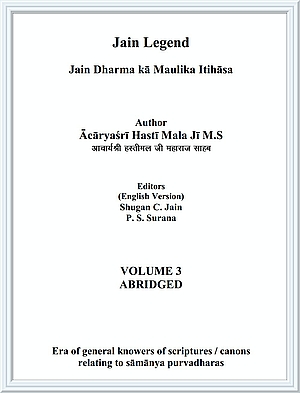| 41st Ācārya Śrī Deva Sena Swāmī | 42nd Ācārya Śrī Śaṃkara Sena | |
| Birth | V.V.1217 | V.N.1239 |
| Initiation | V.N.1275 | V.N.1284 |
| Ācārya post | V.N. 1299 | V.N.1324 |
| Death | V.N.1324 | V.N.1354 |
| Householder life | 58 years | 45 years |
| Ordinary monkhood | 24 years | 40 years |
| Ācārya hood | 25 years | 30 years |
| Total monkhood | 49 years | 70 years |
| Lifespan | 107 years | 115 years |
41st Ācārya Śrī Deva Sena Swāmi: After the death in V.N.1299 of 40th pontiff of Lord Mahāvīra, Rājaṛṣi, 82 years old and scholar monk Deva Sena Swāmī was elevated to the post of ācārya and pontiff.
42nd Ācārya Śrī Śaṃkara Sena: After the death in V.N. 1324 of 41st pontiff Ācārya Deva Sena Swāmī, scholar monk Śaṃkara Sena was elevated to the post of 42nd pontiff. He did a great service for the spread of Jainism.
34th epochal-ācārya Śrī Māḍhara Saṃbhūti
| Birth | V.N.1260 |
| Initiation | V.N.1270 |
| Ordinary monkhood | V.N.1270-1300 |
| Epochal- ācārya post | V.N.1300-1360 |
| Death | V.N.1360 |
| Lifespan | 100 years 5 months 5 days |
According to writings in 'Dussamā samaṇa samgha thayaṃ' and its avacūri 'Dvitīyopadaya Yugapradhāna yatram'; Ācārya Saṃbhūti is considered as the 34th epochal-ācārya. But 'Titthogālī Painnaya' considers Saṃbhūti as 34th and Māḍhara Saṃbhūti as 38th epochalācāryas. At the time of the death of Ācārya Saṃbhūti in either V.N. 1350 or V.N.1360; the voluminous Sthānāṃgasūtra was either lost or abridged or reformed.
Ācārya Vīra Bhadra
In the first half of 13th century V.N., Ācārya Vīra Bhadra existed. According to a citation in Kuvalayamālā of Udyotana, it is said that he was a deep scholar of Jain doctrine and while Udyotana lived in Jālora he studied the doctrine under his guidance. Another popular belief concerning him is that at his orders, a grand temple dedicated to Lord Vṛṣabhadeva was built in Jālora.
Ācārya Vīra Bhadra taught the scriptures to the author of Kuvalayamālā, Udyotana. This shows that he was a contemporary of Yākinī Mahattarā Sūnu Hari Bhadra and perhaps significantly elder to him.
It is also estimated that Ācārya Vīra Bhadra, a scholar-expert in rendering the scriptures died when Ācārya Hari Bhadra was rewriting and reforming the old dilapidated MahāNiśītha.
In this way, based on extracts from Kuvalayamālā and other inferences, ĀcāryaVīra Bhadra was a ācārya during latter half of 12th and first half of 13th centuries V.N.
Udyotana (Dākṣiṇya Chinha)
Udyotana, (other name Dākṣiṇya Chinha) of Candra lineage and hailing from Hārila gaccha, earned an immortal fame in the history of Prākṛata language history literature by composing in mixed prose-poetry the famous book 'Kuvalayamālā'.
He was born in a kṣatriya royal family during the last quarter of V.N. 13th century. Being the prince of a royal family, he was called as Rājarṣi. He was son of Baṭeśwara and grandson of Udyotana, both kings of Madāra (Mahādwāra).
Since his birth, there was an auspicious swastika mark on the right side of his body. Due to this reason, in his royal family, royal courts and elsewhere, Udyotana was also known as Dākṣiṇya Chinha.
As a child, Udyotana was deeply interested in studies. Over a period of time and a result of his deep interest, young intelligent Udyotana attained authority in a number of subjects and skills. Fortunately Udyotana had the privilege of listening and learning the true Jain doctrine through the lectures of Ācārya Tattvācārya, who was the sixth ācārya of Hārila gaccha, established by Ācārya Rājarṣi Deva an intellectual disciple of epochal-ācārya Hārila. He realized that only spiritual purification is the essence of this momentary and mortal human life.
So, during these contemplations on self, prince Udyotana developed detachment from this material world. After lots of persuasions, he got the permission from his parents to accept the vows of Śramaṇa monkhood. So leaving all the comforts of his royal life, family attachments etc, he got initiated in Śramaṇa monkhood by Tattvācārya.
After his initiation into Śramaṇa monkhood by Tattvācārya; Udyotana studied the scriptures while serving his guru. Realizing the extraordinary intelligence and keen desire of Udyotana to learn Jain scriptures and doctrine, Tattvācārya decided to send Udyotana to other eminent Jain scholars of that time (Vikram 8th, 9th century) for higher studies. As per the plans, Tattvācārya sent Udyotana to Ācārya Vīra Bhadra, the most renowned scholar of Jain scriptures at that time, for further studies. Udyotana, while serving Ācārya Vīra Bhadra, acquired in depth knowledge of Jain doctrine. Afterwards Tattvācārya sent Udyotana to Yākinī Mahattarā Sūnu and Ācārya Hari Bhadra for deeper studies of Jain logic. While serving Ācārya Hari Bhadra, Udyotana acquired in depth knowledge of Jain logic Alongwith other related subjects. After completing his studies, Udyotana composed his famous text 'Kuvalayamālā' where he wrote that he learnt Jain logic and other similar subjects from Ācārya Hari Bhadra while staying in his close proximity.
Udyotana composed his famous text 'Kuvalayamālā' completely while staying in the temple of Lord Vṛṣabha Deva in Jālora when only a day was left in the start-up Śālivāhana Śaka calendar on the third part of Caitravadī 14th. Udyotana has written in the citation of 'Kuvalayamālā' that he composed this text when Jālora was ruled by King Śrīvatsa.
'Kuvalayamālā' is a supreme text of story literature in Prākṛata. The flow of the Prākṛata language in this text is like the natural stream of Jina sermons flowing with its musical notes and all beneficial manners. The impact of 'Samarāyicca Kahā' Immortal masterpiece of his guru Hari Bhadra is quite imminent. Language and philosophy of 'Kuvalayamālā' is a proof that his study of Jainism was indeed very deep.
His two disciples' Śrīvatsa and Baladeva were also decorated with the post of ācārya. Both of them appear to be scholars.
 Acharya Hasti Mala
Acharya Hasti Mala
